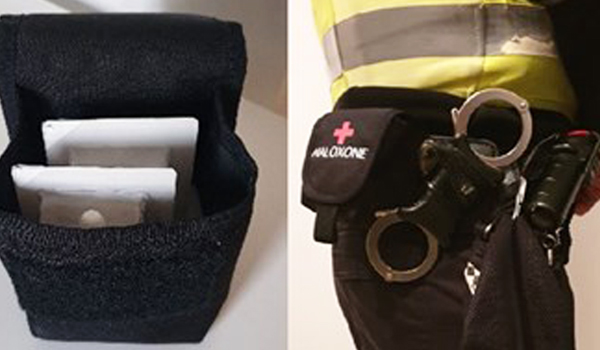Naloxone rolled out to more Police Scotland divisions
The national roll-out of Naloxone to Police Scotland officers has gathered pace with a further 3,000 kits issued in recent weeks.
Police Scotland said all operational officers are now expected to receive the opioid reversal treatment kits in early 2023.
Nearly 4,000 officers are now both trained and equipped with Naloxone, or are due to undertake online training in the coming weeks.
“Around 3,000 kits have been issued throughout Edinburgh, Highland and Islands, Dundee and Forth Valley divisions in recent weeks, where operational officers are now being trained and equipped,” said Police Scotland.
“The deliveries mark the completion of roll-outs to operational officers up to and including the rank of inspector in both Highland and Islands and Forth Valley, while officers in Edinburgh will be supplied with kits for the first time.”
The force added that the roll-out also continues in Tayside Division, which was one of the original test-bed areas, and will get underway “imminently” to officers in Ayrshire and North East Divisions.
Probationary constables will also be trained in the use of Naloxone during their initial training at the Police Scotland headquarters, Tulliallan.
Police Scotland successfully piloted the carriage and use of Naloxone by its officers last year as part of a public health approach to addressing the country’s drug death rates, which are the highest in Europe.
Officers in four areas (Falkirk, Grangemouth and Stirling; Dundee City; Glasgow East, Caithness, and local custody suites) began carrying the single use intra-nasal sprays in March 2021.
Since then it has been used in at least 95 incidents by officers, with positive outcomes on all but four occasions, said Police Scotland.
In three of the four incidents, officers suspected the individual was already deceased, however, they administered Naloxone to give the casualty every possible chance at recovery.
In the fourth instance the individual did not regain consciousness and later died in hospital.
Assistant Chief Constable Gary Ritchie (Partnerships, Preventions and Community Wellbeing) said: “The national roll-out of Naloxone comes following a robust, independent evaluation of our test of change.
“As our officers are so often the first on the scene of a critical incident, it is right we equip them with this additional first aid resource, which can be used safely and with no adverse effects.
“We are working closely with partners to ensure adequate expertise is accessible to people who have received Naloxone from our officers. This includes the ambulance service as well as health colleagues who are best placed to provide additional support.
“Our approach to drugs in Scotland remains twofold. We are committed to protecting the most vulnerable people in society in times of crisis, and Naloxone helps us to do this.
“However, we remain resolutely determined to do all we can to stop illegal drugs reaching our villages, towns and cities in the first place. We continue to use all available resources to bring those involved in serious and organised crime to justice, and to safeguard Scotland’s communities.”
The circumstances in which Naloxone has been administered by Police Scotland has included incidents where officers have discovered unconscious casualties while on patrol, or been alerted to an overdose by a member of the public. Other incidents have involved people in police custody, during police public order incidents and the execution of a search warrant. Naloxone has also been administered to people intending to complete suicide.


